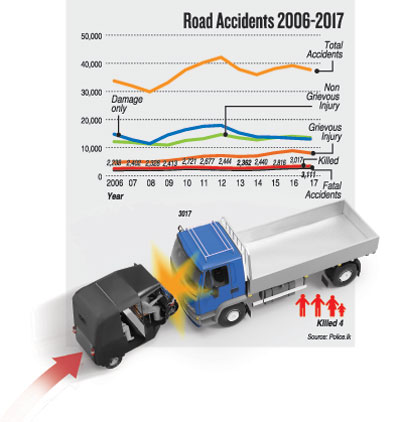News
Vehicle safety features overlooked amid road traffic carnage
Sri Lankan motor vehicle dealers import millions of used and new cars, motorbikes and three-wheelers mostly from Japan, India, and China, but none is known to have basic safety features. Experts believe safety features must now be taken into account in dealing with the epidemic of road traffic deaths, not just driver-related factors.
And in the meantime, the road traffic carnage continues. Condemned wrecks are piling up. Last year, the death toll was 3,111 from 2,933 fatal road accidents.

Karuwalagaswewa police station: A lorry and bus that were involved in an accident this week. Pic by Karuwalagaswewa Jayaratne
The Director of Traffic Administration and Road Safety, SP Indika Hapugoda, said that motorcycles and three-wheeler drivers are the biggest culprits. Motorcycle riders account for the biggest number of road traffic accidents, and three-wheelers follow in second place.
The reckless bus drivers, and tipper truck drivers are also causing mayhem on provincial roads.
There were 74,885 traffic related court cases last year.
SP Hapugoda said drivers who are dozing off at the wheel, driving drunk, and speeding are the main causes.
“Most of the recent accidents involve the driver falling asleep. Instances of drunk driving have also risen, especially this month as it’s the Avurudu season,” SP Hapugoda said.
Earlier this week, a family of four were killed in Galewela. The son who was driving their trishaw, which crashed into an oncoming lorry, is suspected to have fallen asleep.
To deal with drunk driving, the police have imported 100,000 new breathalysers.
Dr Sisira Kodagoda, the chairman of the National Council for Road Safety, confirmed this, adding that some of the advanced equipment will help detect drivers who are breaking the law.
Both SP Hapugoda and Dr Kodagoda said public awareness programmes on road safety are continuing.
“Pedestrians are careless, too. They cross the road in a negligent manner and walk on the road instead of on the pavement,” SP Hapugoda said.
Commenting on the proposed Rs 25,000 fine for traffic offences, Dr Kodagoda said that following protests by private bus drivers and an appeal to President Maithripala Sirisena, it will be reduced.
The fine for speeding will be Rs 6,000 for driving at between 70 and 100 kilometres per hour. For driving at over 100km/ph the fine is Rs 12,000.
The fine for overtaking from the left-side will be Rs 3,000. This is yet to be gazetted by the Ministry of Transport.
Professor Amal Kumarage, an expert on transport and logistics, said that the Government has to consider road accidents as a serious impediment to progress.
“We lose about 3,000 people a year,” he said. “Presently it is not given the priority it deserves. Sweden has a Vision Zero plan which aims to bring the number of road-related fatalities and serious injuries to zero. The governments of many developed countries have funded such programmes, ours hasn’t.
“While it is true that drivers are at fault, there are other issues to consider, too. Research has shown that poor road design is to be blamed as well. As are the poor standards of vehicles that are imported,’’ Prof. Kumarage said.
He said that most imported vehicles do not offer basic protection, and no developed country would allow such imports.
“We don’t look at accident black spots, an area where accidents frequently occur; like a junction or crossing, and do something about it,” Prof Kumarage said.
He also suggests raising insurance premiums for offenders.
“In other countries, drivers who frequently damage their vehicles in accidents are subjected to higher premiums. This serves as an incentive for them to be more careful. We don’t have such a policy,” he said.
“Also everyone expects the Government to take all the action. While it is they who are trusted with ensuring public safety, it has to be a collective effort, with private institutions stepping forward, too. Road safety is a long-term commitment, requiring the efforts of all.”

